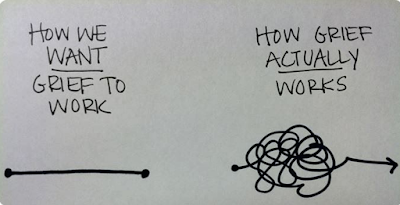When Someone You Love Dies: Notes for the Living
Until confronted by it ourselves, we tend to ignore death and grief. For something that is all around us, all the time, it seems invisible --- right up until we become the ones blindsided by the news of the death of someone in our intimate circle -- parents, spouses, children, siblings, close friends. My friend Erik said to me, "As the Greeks say, eventually, time and tragedy come for all of us." Truth.
I am in the process of writing down some thoughts. Here is a list of things that, in retrospect, I wish I could have articulated to people in the wake of my mom's death about how to help and what they could anticipate from me. There is no order and this list might not help you.
But I hope it helps. If you are grieving, I send comfort and love. If you want to help someone who is grieving, I send comfort and love.
To My People: I am Grieving and Here's How to Respond
- Do something. Anything. Just do not ask me what you can do. Any simple act of kindness is appreciated. I don't want to be rude, but I literally cannot manage your response to my grief. Please don't ask me what you can do. Figure out a way to show me you care.
- I appreciate you, even if I don't respond to you. I absolutely love your texts, your cards, your emails, your photos, your calls, your pie, your prayers into the darkness, your visits, your casseroles, your gift cards. I need them. They help. They fill the space between me and the enormous black hole that threatens to engulf me. I just don't always have the bandwith to respond.(Also, let me just say that I finally get the food thing. Not only is it a ritual act of practical care, it is necessary to bring food to the grieving. The prospect of procuring, preparing, consuming and cleaning up food in the aftermath of death is just so not possible to fathom for the heartbroken.)
- I am not OK. Even if I am laughing, functioning at work, asking you a question, trust that I am not OK and I won't be for a long time. I will let you know when I am OK. Until then, assume that I am fragile. I have good hours and bad hours, good days and bad days, good weeks and bad weeks. My interior life is a bit of a minefield. I can't predict it and I can't warn you.
- If you knew my loved one, I need you. I need new memories and I need stories that absorb the shock that comes with the realization that I won't get to build any new memories with them. The idea that ours is a completed story terrifies me. Please share your stories of her and make her live for me in those stories.
- Assume I am thinking of my loved one even if I don't say anything about her. She is always on my mind, somewhere, somehow. Grief is not a one-and-done thing. I might be talking about cinammon crepes, but I am also grieving, too.
- "She had a good life," "It was her time," "God has a plan," "At least she didn't suffer," "She had another calling," or any other truism that you think might take the edge off my grief is probably best left unsaid. Just tell me you're sorry and you are thinking of us all. The rest? Meh.
- I don't want to process everything right now and I don't need to. Take my lead when it comes to talking about the loss and the grief.
- I might make you uncomfortable. I might say strange things. I might be cold, uncommunicative, unresponsive and, basically, a total pain to support and you might not find it a lot of fun to support me. I might not respond the way you would respond. I need you to let me be me and find my own way through my grief. Please support me.
- If you've been through Big Grief, do ask if I want you to share your experiences. I might want you to, or I might not be able to bear it right now. Do help me navigate, but don't overburden me in an attempt to show solidarity. I am fragile and overwhelmed and your stories of loss run a fine line between helping me and making me feel like I am drowning.
- Like this list, my grieving self is a work in progress.










Comments
Post a Comment